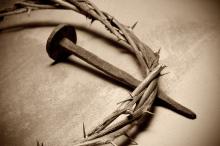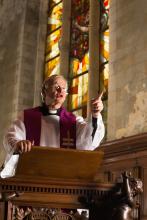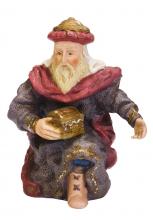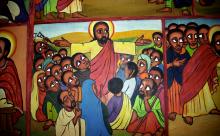Jesus

IN 2013, Sojourners commissioned a messaging study to contribute to the creation care movement—the Christian response to climate change. We polled nearly 1,100 people, oversampling for evangelical Christians, since evangelicals can be politically effective when activated on justice issues, as they have been on immigration, HIV/AIDS, and human trafficking.
Our goal was not only to learn evangelicals’ attitudes about climate change, but also to explore which messages are most compelling so we can better communicate on the issue and make an effective difference for God’s creation.
The first thing we learned was that many of the common stereotypes about evangelicals and climate change simply aren’t true. For one thing, the majority of evangelicals we surveyed (60 percent) agree that climate change is happening, and most say that human activity plays a role.
Second, one’s position on climate change is better predicted by political affiliation than by religion but, interestingly, evangelical Republicans are more likely to support action on climate change than non-evangelical Republicans. Young evangelicals are also more receptive to climate change messages than non-evangelical young people. And for those who don’t agree with us on climate change, there is a low level of certainty: Twenty-five percent of evangelicals are in the moveable middle, either “somewhat sure” that climate change isn’t happening or undecided. This means there’s a good chance that they already care, or that their opinion could be changed.
WHEN I FOUND out years ago that most early Pentecostal denominations had been committed to nonviolence—including the Assemblies of God, the denomination of my heritage—I thought it was about the dumbest thing I’d ever heard. Not kill for the United States of America (or any country)?
Then I stumbled upon the Pentecostal Evangel, a weekly magazine of the Assemblies of God (USA), which published these revealing words during World War I:
From the very beginning the [Pentecostal] movement has been characterized by Quaker principles. The laws of the Kingdom, laid down by our elder brother, Jesus Christ, in the Sermon on the Mount, have been unqualifiedly adopted, consequently the movement has found itself opposed to the spilling of the blood of any man.
This was new to me. I was reared in a U.S. Pentecostalism that taught intense loyalty to the United States and deep pride in combatant military service. Where did this hidden history of Pentecostal nonviolence come from?
Reading other early accounts of Pentecostal peacemaking prompted me to further examine where it had gone and whether it could re-emerge. It would also challenge and deconstruct my understanding of Christianity.
WHEN MOST PEOPLE remember George McGovern, the longtime South Dakota senator who passed away in 2012, they probably don’t think first of his evangelical Christian background or see him as a model for evangelicals today.
But McGovern, the Democratic nominee who ran against President Richard Nixon in 1972, actually serves as a worthy exemplar of evangelically rooted social action.
The source of McGovern’s progressive and moral political views may be surprising to some. He was a son of the evangelical church. His father, Rev. Joseph McGovern, was an ordained minister of the Wesleyan Methodist Church (now the Wesleyan Church). It was founded in 1843 as a protest movement against the larger Methodist Episcopal Church. Simply put, they thought slavery sinful and left the denomination to make clear their moral opposition to the “peculiar institution.”
George McGovern enjoyed a good relationship with his father. His childhood was shaped by the rhythms of church life—three or four services on Sunday, prayer meeting on Wednesday night, and daily prayer and Bible readings. The annual family vacation was a two-week campout at nearby Mitchell Holiness Campground. Revival services were conducted nightly.
AS I ATTENDED seminary in my native Chicago, I heard about one senseless death after another. A six-month-old baby shot multiple times with an assault weapon; a young black girl, with promise and a future, caught in the crossfire—all casualties of gang violence.
This violence is further evidence to me that our theology is needed on the streets. A theology that can impact the crisis facing the black community must be relevant to the black community. Theology can never be disengaged from the history of black people, the “isms” that have oppressed us, and the struggles that have birthed our progress. “Relevancy,” for theology, means moving beyond the academy and the church and into the streets, where it becomes our thinking faith in action.
Does our theology have anything to say to African-American gang girls? The formation of girl gangs is rooted in the numerous social ills affecting many urban African-American communities. By taking our theology to the streets, we can offer African-American gang girls an alternative hope and future. Four theological frameworks can aid in that task.
First, a practical theology—thinking faith in action—that models Jesus’ ministry to the marginalized can reach these girls with the message of God’s compassion, peace, and hope by offering a positive relational sisterhood that can replace gang life.

“GOD CREATED the world and we created borders.”
That obvious recognition was shared at a recent consultation in Quito, Ecuador, between North American and Latin American churches on “Faith, Economy, and Migration.” Felipe Adolf, president of the Latin American Council of Churches, shared that conclusion on how issues of migration and reform are global and not just local.
It’s very easy to see the problems confronting our nation and feel as though the challenges facing the rest of the world are simply too much to bear. Continuing poverty and unemployment, discrimination of all kinds, and wars and rumors of wars fill our newsfeeds, papers, and TV screens. But it’s naïve and narrow to think this way. Many of the threats we face are global in nature and don’t know any boundaries. Through our economies and consumption habits, media, travels and migrations, and for Christians in particular our faith, we are inextricably connected with men and women around the world. It’s always been important, but now especially so, to think globally when it comes to faith and justice.
Sojourners has a long history of doing this very thing. We started as a little group of two kinds of people—those who had grown up conservative evangelicals and were deeply frustrated with the lack of attention to issues of justice and peace, and those who had just come to faith from the student movements and counterculture of the 1960s and ’70s. We met at Trinity Evangelical Divinity School and began to study and pray through the scriptures about injustice, war, and poverty. The Vietnam War was raging, and we were looking for a biblical understanding of the events of our time.

At a moment when the world is flush with new books and ever-evolving interpretations of Jesus, one of the last century’s artistic masters is providing art lovers with a striking take on the first-century religious figure.
The first U.S. exhibition exploring the “darker works” of Marc Chagall (1887-1985) shows a Jewish artist obsessed with Jesus.
“Chagall: Love, War, and Exile,” at The Jewish Museum in New York showcases the work of the Russian-French artist during World War II as he tried to make sense of a world gone mad.
Of particular interest are paintings depicting the crucified Jesus — depictions that are often read as metaphors not only for war but the particular expressions of Jewish suffering and persecution in Europe during the 1930s and 1940s.

(Editor's Note: This post was adapted from the author's speech at the Christianity 21 Conference in Denver.)
When I was in seminary, one of my best friends came up with a brilliant theological … pick up line:
"Hey, baby. What’s your hermeneutic?"
Despite the genius of that question, we soon discovered that anytime you start a pick up line with “Hey, baby” you’re in some trouble.
But it’s such a great question. Think of all the relationships that would have avoided painful break ups if they just defined the relationship in the beginning by answering the question “What’s your hermeneutic?"

It’s become a disturbing trend among Christians to lament the downfall of our nation’s “Christian identity” — to judge and criticize the spiritual downfall of the current generation. They boast about the glorious past and predict an apocalyptic demise for the future — brought on by the secularization and ethical demise of our society.
This attitude is based around a sense of fear, judgment, cynicism, fatalism, and hopelessness.
Many Christians today use the term “post-Christian” to describe the United States in conjunction with their assumptions that our nation is falling deeper and deeper into a moral decline, but this word presupposes that we were Christian to begin with. We weren’t.

Can you imagine? I am now three score plus 10! According to measurements used during biblical times, a "score" was 20 years. Three score is 60 years. So three score plus ten, makes me 70. Moses put is this way in Psalms 90: "Seventy years are given to us! Some even live to eighty. But even the best years are filled with pain and trouble; soon they disappear, and we fly away." Well, I am not quite ready to fly away!
When I was a child, a 70-year-old person was truly ancient; like, really, really old. I imagined they were almost as old as dirt, salt, or the oldest Bible character, Methuselah. In my child's mind, 70 was too old to move fast, think hard, feel deeply, laugh out loud, dance gracefully, exercise intensely, and experience joy. Mostly, 70 year olds were just waiting to die. Right? Of course, they were definitely too advanced in years to think, feel, or act sexually, even though researchers say otherwise.
What is so amazing is that I feel many times better today than I felt at 60, 50, or even 40. 70 really IS the new 50!
“Jesus was a radical who welcomed everyone and criticized powerful leaders who oppressed the poor. Jesus was crucified because he was a political threat. But the Apostle Paul was a conservative missionary who misunderstood Jesus and was anti-woman, pro-slavery, and anti-gay.”
That seems to sum up how many progressive Christians view Paul. But are such views justified by the biblical record? Or are there other ways to understand the zealous Pharisee who became an apostle to the Gentiles?
IN THE EARLY 1970s, I came across an article on Jesus’ women disciples in the Christian social justice magazine The Other Side. I was shocked. I had attended church all my life; how come I never noticed those women disciples?
What I didn’t know then was that a renewed “search for the historical Jesus” was underway. Applying the ever-developing insights of sociology, anthropology, and archaeology, scholars were investigating the socio-economic and political aspects of life in first century Palestine. How did Jesus fit into his historical context? As a peasant healer, how did he challenge the Roman occupation and their clients, the chief priests at the temple in Jerusalem?
It takes a while for new insights from biblical research to reach lay Christians. This is further delayed if church leaders are suspicious of intellectual elitism and fearful some of their parishioners might “lose their faith.”
MANY PEOPLE HAVE been given a very tame and uninteresting version of Jesus. He was a nice, quiet, gentle, perhaps somewhat fragile guy on whose lap children liked to sit. He walked around in flowing robes in pastel colors, freshly washed and pressed, holding a small sheep in one arm and raising the other as if hailing a taxi. Or he was like an “x” or “n”—an abstract part of a mathematical equation, not important primarily because of what he said or how he lived, but only because he filled a role in a cosmic calculus of damnation and forgiveness.
The real Jesus was far more complex and interesting than any of these caricatures. And nowhere was he more defiant, subversive, courageous, and creative than when he took the language of fire and brimstone from his greatest critics and used it for a very different purpose.
The idea of hell entered Jewish thought rather late. In Jesus’ day, as in our own, more traditional Jews—especially those of the Sadducee party—had little to say about the afterlife, about miracles, about angels and the like. Their focus was on this life and on how to be good, just, and successful human beings within it. More liberal Jews—especially of the Pharisee party—had welcomed ideas on the afterlife from neighboring cultures and religions, especially the Persians.
To the north and east in Mesopotamia, people believed that the souls of the dead migrated to an underworld whose geography resembled an ancient walled city. Good and evil, high-born and lowly, all descended to this shadowy, scary, dark, inescapable realm. For the Egyptians to the south, the newly departed faced a ritual trial of judgment. Bad people who failed the test were then devoured by a crocodile-headed deity, and good people who passed the test settled in the land beyond the sunset.

One of my favorite quotes of 2013 comes from Pope Francis. Asked what he would say about a member of the Catholic clergy who is gay, he responded with a question of his own.
“Who am I to judge?” Francis replied.
A good question for all of us, no?
Our world is inundated with judgment. Social media can be a swamp of it. Recently, a television celebrity was judgmental about those who are different from him and got in trouble for it. Many defended his judgmental attitude and words.
Which raises some important questions for all of us: Is it good to be judgmental? Isn’t life about making judgment calls and living by our values? Aren’t we all judgmental in some ways?
We all make judgments every day, decisions about what we think is best to do in the various circumstances of our lives. We might see someone in need and decide to help. We might recognize one of our shortcomings and decide we’ll change. We might run into an unforeseen challenge and try to figure out the best way to respond.
That’s all well and good.
Being judgmental is a very different thing.

Sentiments of frustration are growing among many followers of Jesus who admire Christ but despise certain things associated with him.
They look at the New Testament and are attracted to Jesus’s selfless acts of generosity, service, and love, but don’t see the same spirit in today’s “Christian” institutions, churches, communities, and faith leaders.
Modern faith is often a complex minefield of theologies, doctrines, practices, and expectations, where individuals carefully walk on eggshells to avoid a litany of “sins” and “heresies” that will inevitably attract the wrath from religious friends, strangers, and authorities.

April 15, 2013 — it wasn’t tax day that got my attention. It was during my lunch break, in the teacher’s lounge that I first heard of the explosions in Boston. My heart sank. I knew our son, who attends college in nearby Cambridge, was planning to visit the finish line with some of his friends to enjoy watching and cheering on the runners. One of his dreams, to run among them, postponed for a future year when more hours and more miles of practice were available. They had explored much of the course the day prior and especially wanted to see the élite runners cross the finish.
Amid the unfolding awfulness of that day I felt a tinge of guilt as we breathed a sigh of relief at news of his safety. Safe by two blocks and two hours owing mostly to large crowds that had kept him out of close proximity and a study ethic that sent all four of them back to class prior to the 2:49 p.m. calamity. Over the next couple days in my mind, I toggled between distraction and dread as I tried to go about the normality of life while asking God both “why?” and “why not?” questions.

Christmas is the one time each year when much of the world turns its gaze to Bethlehem, the West Bank town at the heart of the Gospel account of Jesus’ humble birth in a stable.
But Bethlehem may be in for a second round of global publicity in the span of a few months with the expected visit of Pope Francis in May.
In an interview earlier this month, Francis confirmed rumors that he planned to travel to the Holy Land — probably stopping at sites in Jordan, Israel and the West Bank in the Palestinian territories — and said preparations were underway.
Then last week the Latin patriarch of Jerusalem, the top Catholic official in the region, revealed that the visit was set for May.
Given the political and religious combustibility that attends almost any event in the Holy Land, a papal trip was bound to be fraught and a debate over the visit quickly erupted as Israeli newspapers reported that the preliminary itinerary for Francis’ pilgrimage has him spending just one full day in Israel proper — probably arriving in Jordan on Saturday, May 24, traveling to Israel on Sunday morning, then celebrating Mass in Bethlehem on Monday before heading back to Rome.

A generation or two ago, when America’s Muslims were new immigrants who made up an even smaller minority of Americans than they do today, they viewed the lights, trees, carols, gifts, and festive spirit of Christmas as a threat to their children’s Islamic faith.
But these days, a growing number of Muslims celebrate Christmas, or at least partake in some ways, even if they don’t decorate their homes with trees and a light show. Indeed, many Muslim families have created their own Christmas traditions.
“I teach my three children, who attend public school and happen to be born into an interfaith Christian-Muslim family, that we absolutely do celebrate Christmas because we are Muslim,” Hannah Hawk of Houston wrote in an email. Rather than putting up a tree or lights, “we celebrate the reason for the season, Jesus, by studying all that is written about him in the Quran and by examining historical theories.”

Every year, a chorus of Christians join together to bemoan the “War on Christmas,” lambasting their enemies for taking Christ out of Christmas, and yearning for the days when everyone remembered the reason for the season.
But have we all forgotten? There has always been a war on Christmas. In fact, conflict lies at the very heart of Christmas. To those who say that Christmas is all about peace on earth, a quick look at the second chapter of Matthew and the largely overlooked story of King Herod reminds us that this peace comes at a price. For it is the kind of peace that can only come through conflict. Before caroling, there was weeping in Ramah.
It’s no surprise that most Christmas pageants leave out the Herod story. King Herod jealously guarded his power, killing anyone who got in his way. When he learns of Jesus’ birth, he declares the first war on Christmas. Herod doesn’t just want to kill Jesus. He wants to destroy him, taking Christ out of Christmas once and for all. When his efforts are thwarted, he resorts to genocide to ensure Jesus’ demise, murdering every male infant in Bethlehem. This, for Herod, is a bargain to rival any department store sale: The lives of Bethlehem’s youngest? A mere pittance for unrivaled power.
In other words, Herod gets it. Herod, more than anyone else in the story so far, sees this poor, refugee child for who he really is — a rival king.

Ah, Christmas! The most wonderful time of the year. A time to gather with family and friends, and, with a smile on our faces, pretend we aren’t quietly measuring who received the best present and which relative really, really needs to stop drinking. A time to hang tinsel and baubles from the tree, and a time to hang up our hopes of losing that last 10 pounds this year. Such a joyous season!
The real point here is that Christmas is what we make of it. For Christians, however, there are some very specific things you can’t do if you want to actually honor and follow the person we celebrate this season. So, I give you my “10 Things You Can’t Do AT CHRISTMAS While Following Jesus.” As with my other “10 Things” lists, this is not intended to be a complete list, but it is a pretty good start.

In a secularized society obsessed with consumerism, entertainment, and modernization, Christianity is often portrayed as being old-fashioned, irrelevant, and useless, but it still serves some very valuable and profound purposes. Here’s why Americans still need it:

In the wake of Megyn Kelly’s statement that “Jesus was a white man,” critics have quickly and unanimously responded that Jesus was not a white man.
Rev. Laura Barkley debunked Kelly’s statements for Sojourners, noting that Jesus “was a Palestinian Jew in first-century Nazareth.”